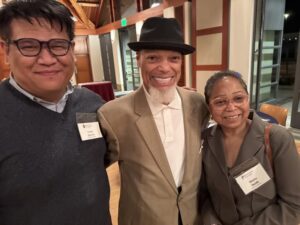 On Friday, the Very Rev. Canon Ian Elliott Davies, rector of Saint Thomas the Apostle, Hollywood, told me about a book by Paul Avis called “Becoming a Bishop: A Theological Handbook of Episcopal Ministry.” My response was that, nearly nine years into this, I was way overdue reading it.
On Friday, the Very Rev. Canon Ian Elliott Davies, rector of Saint Thomas the Apostle, Hollywood, told me about a book by Paul Avis called “Becoming a Bishop: A Theological Handbook of Episcopal Ministry.” My response was that, nearly nine years into this, I was way overdue reading it.
He lent it to me Saturday, when he was at St. Paul’s Commons, Echo Park for a Commission on Ministry meeting. After a brief scan, I’ve fixed on two of the things Paul stresses. First, among the keys to a bishop’s success is collaborative leadership. Second, collaborative leadership is really hard for ordained people, especially bishops.
If you’re not an ordained person, you might not need to bother with this part. If you are an ordained person who isn’t subject to the stressors I’m going to describe, if you are supremely and cheerfully self-confident, feel free to use this time to go for seconds on dessert.
But many, perhaps most, of those going through the world wearing collars find themselves caught between the jagged rock of people’s expectations and the immovable hard place of our fear that we might not ever come up to snuff. Something in the external system expects us to have all the answers. Something in our internal system makes us scared to let on that we don’t.
In keeping with ancient tradition, the transition committee has set up a perfect laboratory for this unpleasant dynamic. Three gifted priests, about to be asked scores of questions, expected to have dazzling answers.
And here’s the thing. They will. Because they will be Antonio, Melissa, and Monica’s answers. Our nominees have made it all the way to this point in a wholesome, fair search process, and so according to the warrant of heaven, their answers are automatically worth hearing. Our God in Christ wants us to understand that we all need to hear everything they have to say.
And because I’m not getting to read Paul Avis’s book until I’m nearly done, I’ll close by telling you what the first chapter of my book would be called. It would be something like “the holiness of listening.” Subject to some of the impulses I’ve just described, the offspring of my insecurity, if there’s one thing I might’ve done more at the beginning, it’s listening. I know that especially because I find I’m impelled to listen so attentively now. As I come to the end of this time as your bishop, the remaining days have become so precious that I find myself wanting to listen and learn as much as I can before this season ends.
This week to come, our nominees will listen to us. We will listen to them. We’ll listen to one another. We’ll all hear the voice of the Holy Spirit in our ears.
The first weekend in November, God’s will shall be done. And then, in one way or another, three amazing priests will continue to do the saving work of Jesus Christ’s gospel of love, peace, and justice in a spiritually famished society and culture that need our little church far more than we probably understand.
[A portion of my remarks at last night’s opening dinner at The Church of Our Saviour in honor of the Rev. Dr. Antonio Gallardo, the Rev. Canon Melissa McCarthy, and the Rev. Monica Burns Mainwaring, nominees as eighth bishop of Los Angeles, preparing to meet the people of the Episcopal Diocese of Los Angeles at meet and greet sessions this week. Most dinner guests were members of the search and transition committees, including Louis Quezon, Marco White, and Sheria Smith.]
